Crossref Citations
This article has been cited by the following publications. This list is generated based on data provided by Crossref.
Trevarthen, Colwyn
1996.
Lateral Asymmetries in Infancy: Implications for the Development of the Hemispheres.
Neuroscience & Biobehavioral Reviews,
Vol. 20,
Issue. 4,
p.
571.



